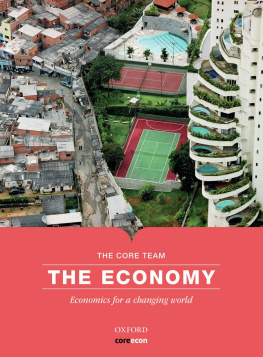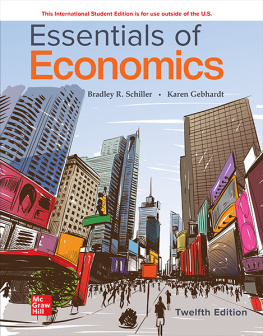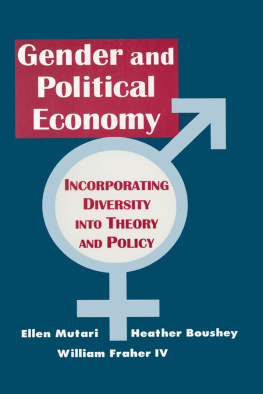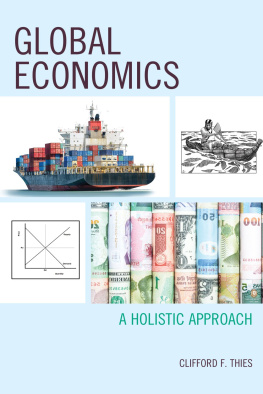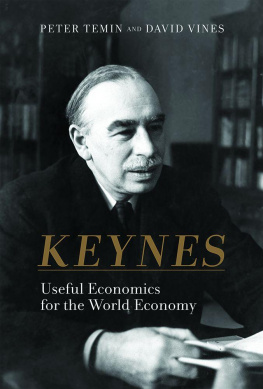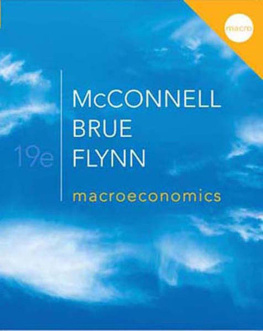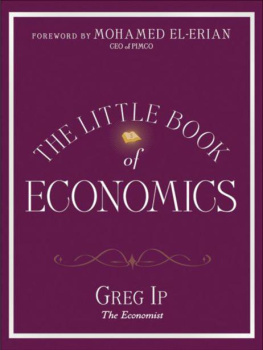The CORE team - The Economy
Here you can read online The CORE team - The Economy full text of the book (entire story) in english for free. Download pdf and epub, get meaning, cover and reviews about this ebook. year: 2018, genre: Politics. Description of the work, (preface) as well as reviews are available. Best literature library LitArk.com created for fans of good reading and offers a wide selection of genres:
Romance novel
Science fiction
Adventure
Detective
Science
History
Home and family
Prose
Art
Politics
Computer
Non-fiction
Religion
Business
Children
Humor
Choose a favorite category and find really read worthwhile books. Enjoy immersion in the world of imagination, feel the emotions of the characters or learn something new for yourself, make an fascinating discovery.
- Book:The Economy
- Author:
- Genre:
- Year:2018
- Rating:3 / 5
- Favourites:Add to favourites
- Your mark:
- 60
- 1
- 2
- 3
- 4
- 5
The Economy: summary, description and annotation
We offer to read an annotation, description, summary or preface (depends on what the author of the book "The Economy" wrote himself). If you haven't found the necessary information about the book — write in the comments, we will try to find it.
COREs approach to teaching economics is student-centred and motivated by real-world problems and real-world data.
The Economy — read online for free the complete book (whole text) full work
Below is the text of the book, divided by pages. System saving the place of the last page read, allows you to conveniently read the book "The Economy" online for free, without having to search again every time where you left off. Put a bookmark, and you can go to the page where you finished reading at any time.
Font size:
Interval:
Bookmark:
The Economy
Text The CORE team
All rights reserved. No part of this book may be reproduced or transmitted in any form or by any electronic or mechanical means, including photocopying and recording, or any other information storage or retrieval system, without written permission from the publisher.
Themes and capstone units
- Leibnizes
In 2014, when we published the first beta of The Economy online, Camila Cea provided a preface. At the time, she was a recent economics graduate, but already a veteran of a successful protest movement in Chile that was advocating policies to advance economic justice. She and her fellow students at the University of Chile had been shocked to discover their economics courses addressed none of their concerns about the problems of Chiles economy. They demanded changes in the curriculum. The director of the School of Economics and Business at the time, Oscar Landerretche, responded to their demands. Camila and Oscar are both now Trustees of CORE Economics Education.
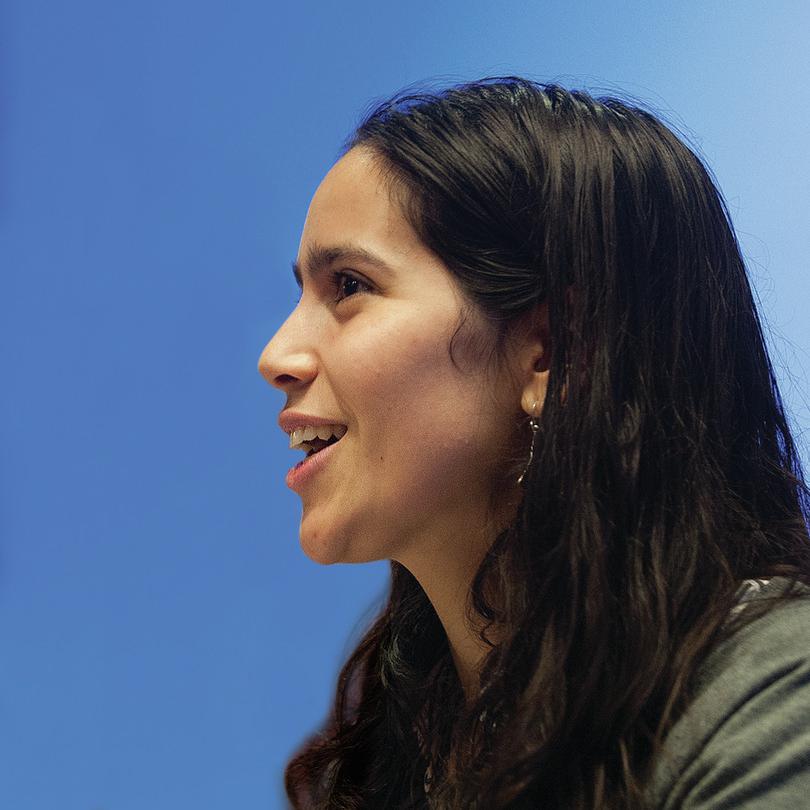
Camila Cea
Since then, courses based on COREs text have been taught as the standard introduction to economics at University College London, Sciences Po (Paris), the Toulouse School of Economics, Azim Premji University (Bangalore), Humboldt University (Berlin), the Lahore University of Management Sciences and many other universities throughout the world. In July 2017, as we write this, 3,000 economics teachers from 89 countries have registered for access to our supplementary teaching materials.
Camilas perspective on The CORE Project at the beginning of our journey captures the motivation that continues to inspire us. She wrote:
We want to change the way economics is taught. Students and teachers tell us this is long overdue. When the Financial Times in the UK wrote about CORE in November 2013, it sparked an online debate about teaching and learning economics that attracted 1,214 posts in 48 hours. Students in economics all over the world were asking, just as I had asked a few years previously: Why has the subject of economics become detached from our experience of real life?
Nataly Grisales, like me an economics student from Latin America, recently wrote about learning economics on her blog: Before I chose economics a professor mentioned that economics would give me a way to describe and predict human behaviour through mathematical tools. That possibility still seems fantastic to me. However, after semesters of study I had many mathematical tools, but all the people whose behaviour I wanted to study had disappeared from the scene.
Like Nataly, I remember asking myself if my economics classes would ever get around to addressing the questions that motivated me to take up economics in the first place.
And thats why my colleagues in the CORE team have created this material. It has made me believe again that studying economics can help you to understand the economic challenges of the real world, and prepare you to confront them.
Please join us.
Camila and Nataly did not get the best that economics has to offer. COREs mission is to introduce students to what economists do now, and what we know. Today, economics is an empirical subject that uses models to make sense of data. These models guide government, business, and many other organizations on the trade-offs they face in designing policies.
Economics can provide tools, concepts and ways to understand the world that address the challenges that drive students like Nataly and Camila to the subject. Sadly, they are often not a big part of the courses that thousands of students take.
In the four years that The CORE Project has been running we have tried an experiment in classrooms around the world. We ask students: What is the most pressing problem that economists should address? The word cloud below shows the response that students at Humboldt University gave to us on the first day of their first class in economics. The size of the word is proportional to the frequency with which they mentioned the word or phrase.
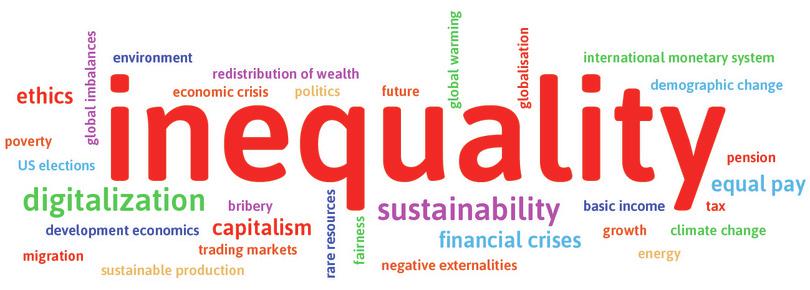
Word cloud emphasizing inequality
The most pressing problems that economists should address, according to students at Humboldt University.
Word clouds from students in Sydney and Bogota are barely distinguishable from this one (you can see them on our website at www.core-econ.org). Even more remarkable, when in 2016 we asked new recruitsmostly but not entirely recent economics graduatesat the Bank of England, and then professional economists and other staff at the New Zealand Treasury and Reserve Bank, both responded the same way: inequality was the most common word in their minds.
Local and global social problems are always on the minds of new students. In France, when we tried the same experiment, unemployment showed up more often. Climate change and environmental problems, automation, and financial instability were frequently mentioned around the world.
Our focus on these real-world problems explains why we called this book The Economy rather than Economics, which is the standard title for introductory texts. The economy is something in the real world. It governs how we interact with each other and with our natural environments in producing the goods and services on which we live. In contrast, economics is a way of understanding that economy, based on facts, concepts and models.
The Economy is a course in economics. Throughout, we start with a question or a problem about the economywhy the advent of capitalism is associated with a sharp increase in average living standards, for exampleand then teach the tools of economics that contribute to an answer.
For each question, the material is in the same sequence. We begin with a historical or current problem, even if it is a complex one, and then we use models to illuminate it. COREs pedagogy thus flips the convention in economics texts on its head. Traditionally, the models are derived first. Perhaps the introduction to the models includes a simple application such as shopping, and a promise that the model will be applied to economic problems in the real world either later in the course, or more likely in later courses.
Because CORE starts with big problems and questions from history and current affairs, the models and explanations we use need to take account of real-world phenomena. For example, actors never have complete information about everything relevant to the decisions they are making, motives other than self-interest are also important, and the exercise of power in strategic behaviour often has to be part of the explanation for the outcome we see.
Recent advances in economics have given us the tools to do this. And because we apply economic models to important, complex and difficult problems, CORE students learn immediately both the insights gained from modelling, and the unavoidable shortcomings of models.
CORE is a truly global project in two ways. Its development spans the world, and it is open to anyone, anywhere, who wants to use it.
Much of our design and interactive features were initiated in Bangalore. The open-source platform for our text and online materials was produced in Cape Town. The printed book version of the material is published by Oxford University Press. Translations and localizations of
Font size:
Interval:
Bookmark:
Similar books «The Economy»
Look at similar books to The Economy. We have selected literature similar in name and meaning in the hope of providing readers with more options to find new, interesting, not yet read works.
Discussion, reviews of the book The Economy and just readers' own opinions. Leave your comments, write what you think about the work, its meaning or the main characters. Specify what exactly you liked and what you didn't like, and why you think so.

